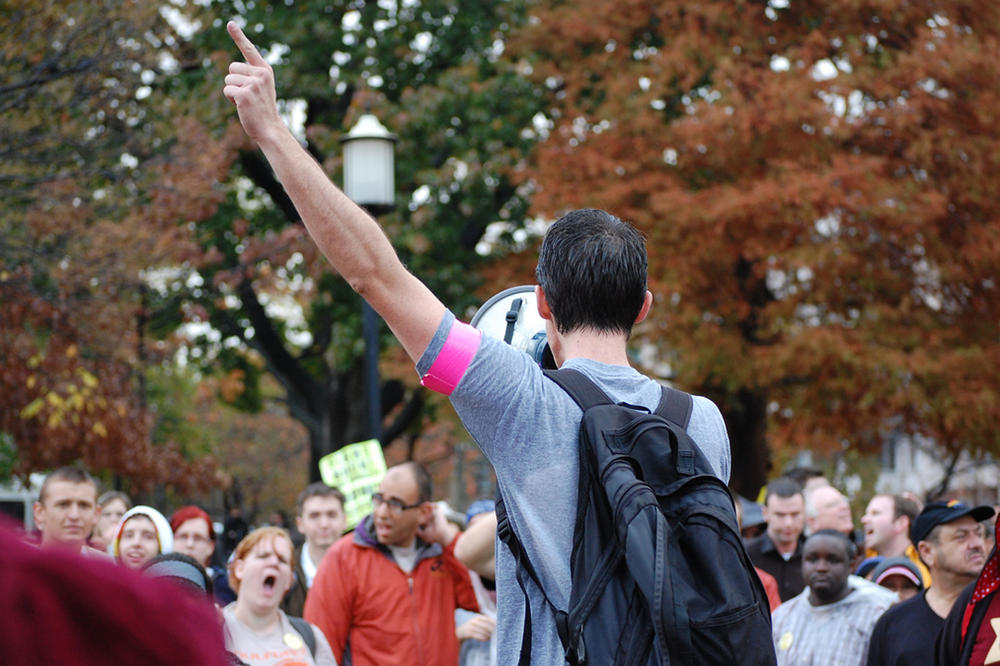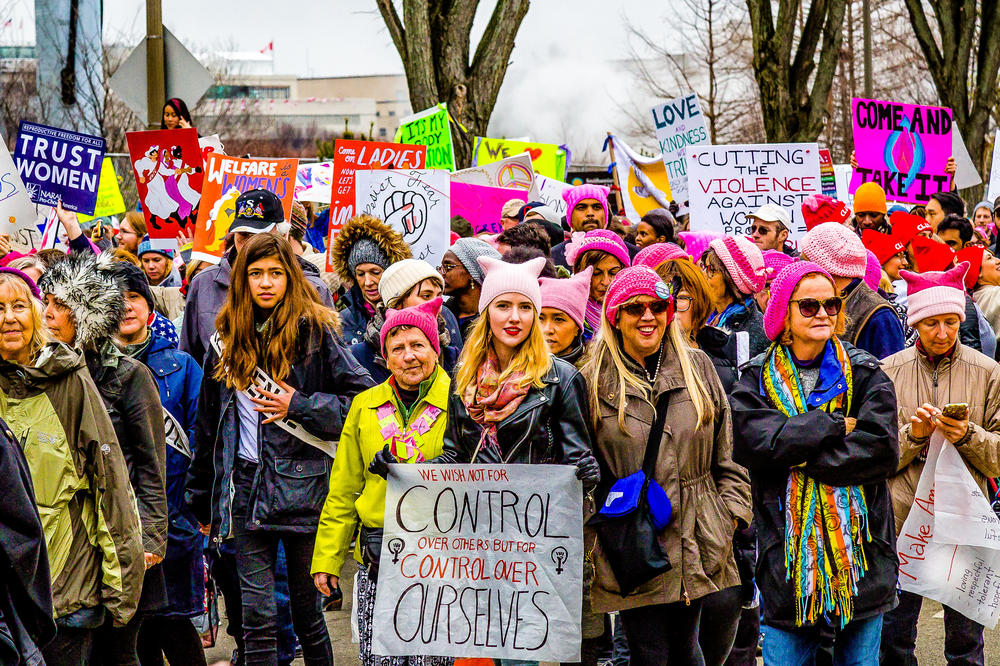In the Age of Constant Agitation
Scholars working for the “Affective Societies” Collaborative Research Center are examining how emotion dominates – in politics, the media, and social movements.
Aug 30, 2017
What’s it all about? The emotional world of demonstrators is the focus of a Collaborative Research Center subproject.
Image Credit: flickr/Jim Kelly (CC BY 2.0)
The moment Donald Trump was elected U.S. President in November 2016 was a shock for many people. It was not long before the term “post-factual” became applied to the era, meaning that “perceived truth” is more effective at convincing people than something that has been scientifically proven. Trump’s election campaign – based as it was on an appeal to the emotions – was a turning point in U.S. public communications, media, and politics.
“We are living in times of upheaval,” says Anne Fleig. But the literary scholar believes that this is not a recent phenomenon. At the end of the Cold War and the time of German reunification in 1989, public discourse was already undergoing a fundamental change. In the age of globalization, people and ideas cross borders, and this is a trigger for emotions to be expressed. In addition, digitalization has boosted the speed of communications.
“We are living in a state of constant agitation,” says Fleig. “We seldom take the time to think about how we approach a piece of news.” In the climate of today, this vague state of agitation – an affect – allows feelings such as fear or anger to erupt far more quickly. Fleig is troubled by the fact that even politicians and journalists, when talking about certain events, refer to their personal feelings. Sociology professor Christian von Scheve says, “Today, talking about emotions in public is generally accepted; this was not the case in the 1950s.”
The researchers are keen to find out which role affects and feelings play in our society – no matter how subtly; and they would like to pin down the ways in which the rules of play in public communication are changing. Fleig and von Scheve head two out of a total of 16 subprojects under the “Affective Societies – Dynamics of Social Coexistence in Mobile Worlds” Collaborative Research Center, in which Technische Universität Berlin and Charité are also involved. The two researchers come from different disciplines but share an interest in language and public communications. “In our everyday lives, the links between language, affects, and emotions are a given”, says Fleig, “but science has yet to come to grips with this.” Many theories of the public domain formulate public communications as a rational exchange between people. In reality, however, Fleig sees sentiments taking the place of argument. Von Scheve says, “Affective theories have up to now concentrated on the body; they have seldom considered language. Now we would like to examine the whole picture.”
The „Women’s March" in January 2017.
Image Credit: Mobilus In Mobili via flickr/CC BY-SA 2.0
Fleig and von Scheve are convinced that affects are not random phenomena, but a fundamental component of public communication. Here, they make a distinction between “affect” and “emotion.” Affects relate to the immediate reactions of various actors to each other; they are governed by and also influence relations. Emotions, on the other hand, are shown in certain expressions and behaviors that have separate characteristics in terms of language, too.
As a literary scholar, Fleig is investigating the role of affects in the public perception of literature. She says that works in the German language are seen and assessed differently when it is known that the author is a person of color, or speaks German with an accent. Reviewers and readers often question the extent to which the author has a degree of allegiance sufficient to entitle them to be writing on a certain subject. “In turn, this has a bearing on self-perception and on their participation in a discourse,” says Fleig. She has spoken to several writers on the subject.
As a sociologist, von Scheve is concerned, together with the literary scholar Jürgen Brokoff, with the conflicts between religious feeling and apparently neutral Western values. For example, in debates – whether on works of art or circumcision – it apparently emerged that the arguments of nonreligious participants were just as emotionally driven as those of religious participants. “Excitability and agitation are by no means the preserve of religious people. The idea that secularism is the rational opposite of religion is nothing more than a construct.” In other contexts, too, von Scheve has observed that indiscriminate references to emotion can stand in the way of solving a conflict. For instance, we know very little about the actual sensitivities of people at a Pegida demonstration. “It is always said that Pegida members are driven by fear. Automatically, one reacts differently to fearful people than to people whose motivation is described as hate, anger, aggravation, or rage.” He deduces that politicians and the media, by picking one emotion out of many possible emotions, limit the potential reactions of society to the Pegida movement.
Fleig and von Scheve also hope that their research on affects will lead to a better understanding of why many people are more willing to adhere to a “perceived truth.” Fleig says: “You can’t reach someone if they reject dialogue. The theories that consider only rational aspects of public communication have so far failed to take this into account.”
This article was first published in Freie Universität’s Tagesspiegel newspaper supplement in April 2017.
Further Information
Partners in the Collaborative Research Center “Affective Societies – Dynamics of Social Coexistence in Mobile Worlds,” based at Freie Universität, are Charité-Universitätsmedizin Berlin, Technische Universität Berlin, and Evangelisches Krankenhaus Königin Elisabeth Herzberge.
Under the supervision of Professor of Sociology Hubert Knoblauch of Technische Universität Berlin, the research project studies public emotion at large gatherings such as professional soccer matches and major events of the Christian calendar. The study analyzes types of expression, the surrounding framework, and prevailing knowledge. Videos, media data, and ethnographic methods will be used to investigate the type of emotions demonstrated collectively and how they are expressed; how shifts occur and what shifts take place in and between the emotional repertoire of the two cultural areas; and what forms and limits of affective resonance can be observed.
The everyday lives of aging migrants from Vietnam in reunified Berlin are the focus of another of the 16 subprojects. Leaders of the subprojects are anthropologist Dr. Anita von Poser of Freie Universität Berlin and psychiatrists Dr. Thi Minh Tam Ta and Dr. Eric Hahn of Charité Department of Psychiatry (CBF) at Campus Benjamin Franklin. The project centers on first-generation Vietnamese migrants who lived in East or West Germany as a result of various policies since 1977 and were consequently challenged on different emotional and affective fronts – indeed, are still feeling the effects of this today.


